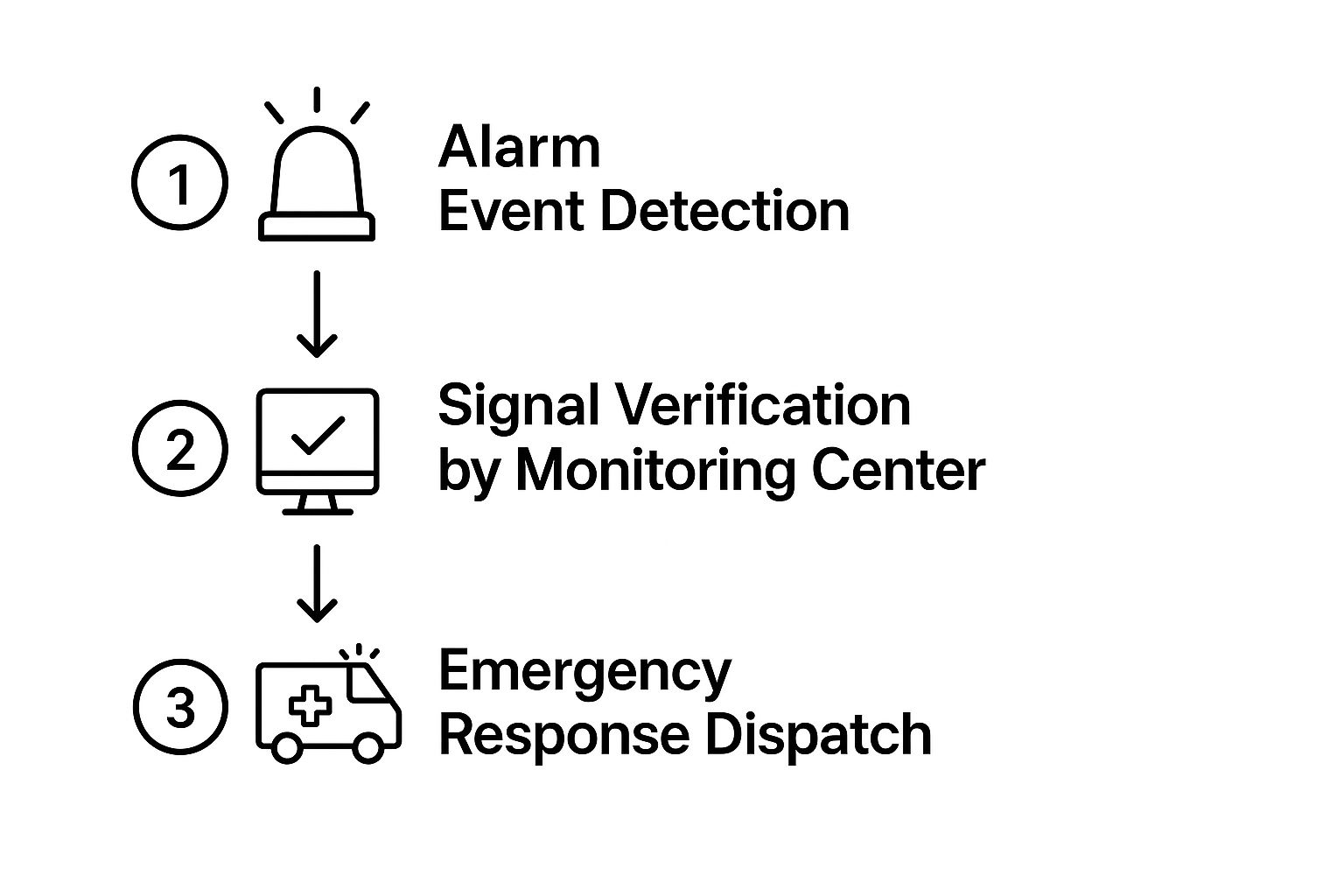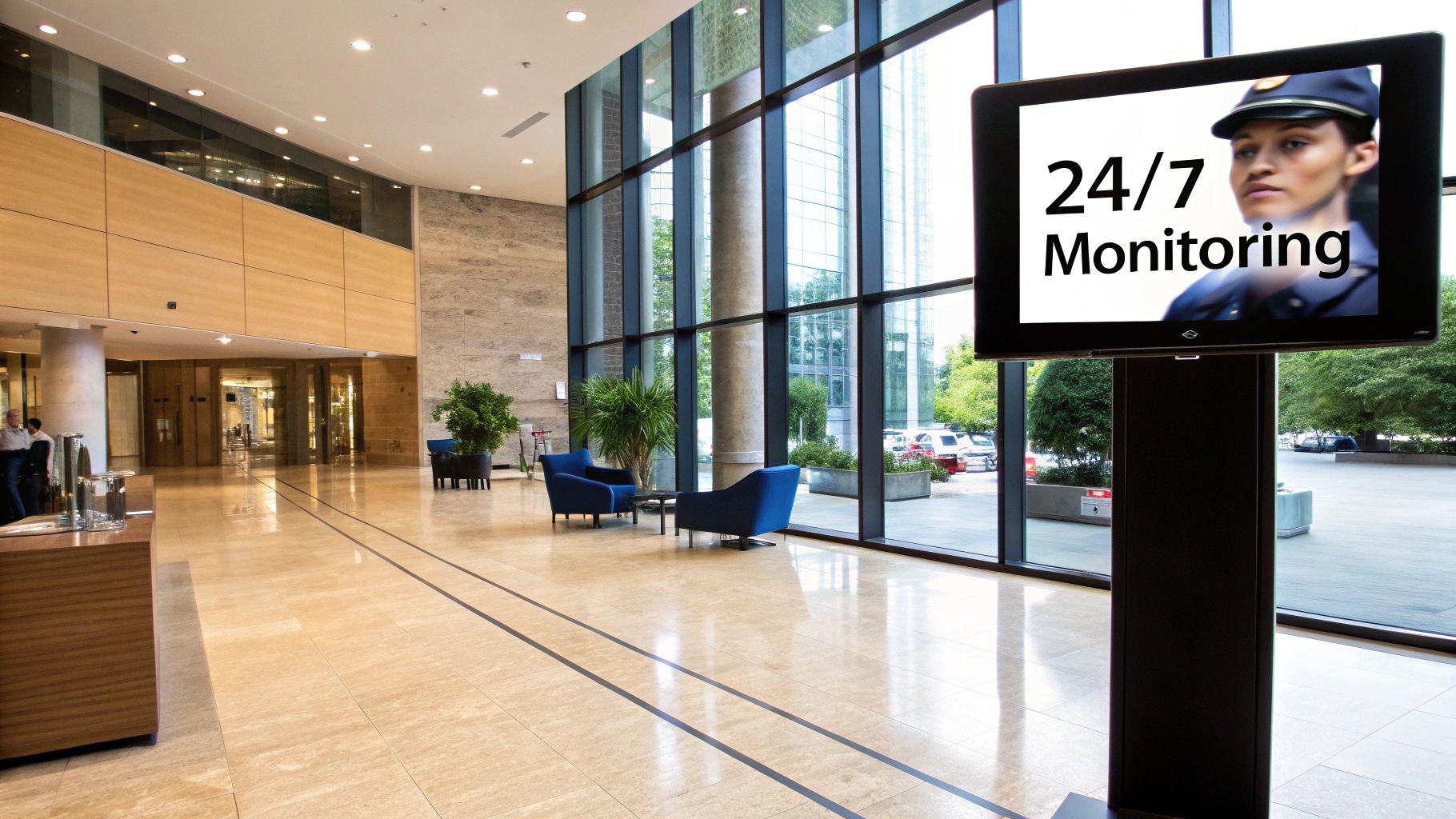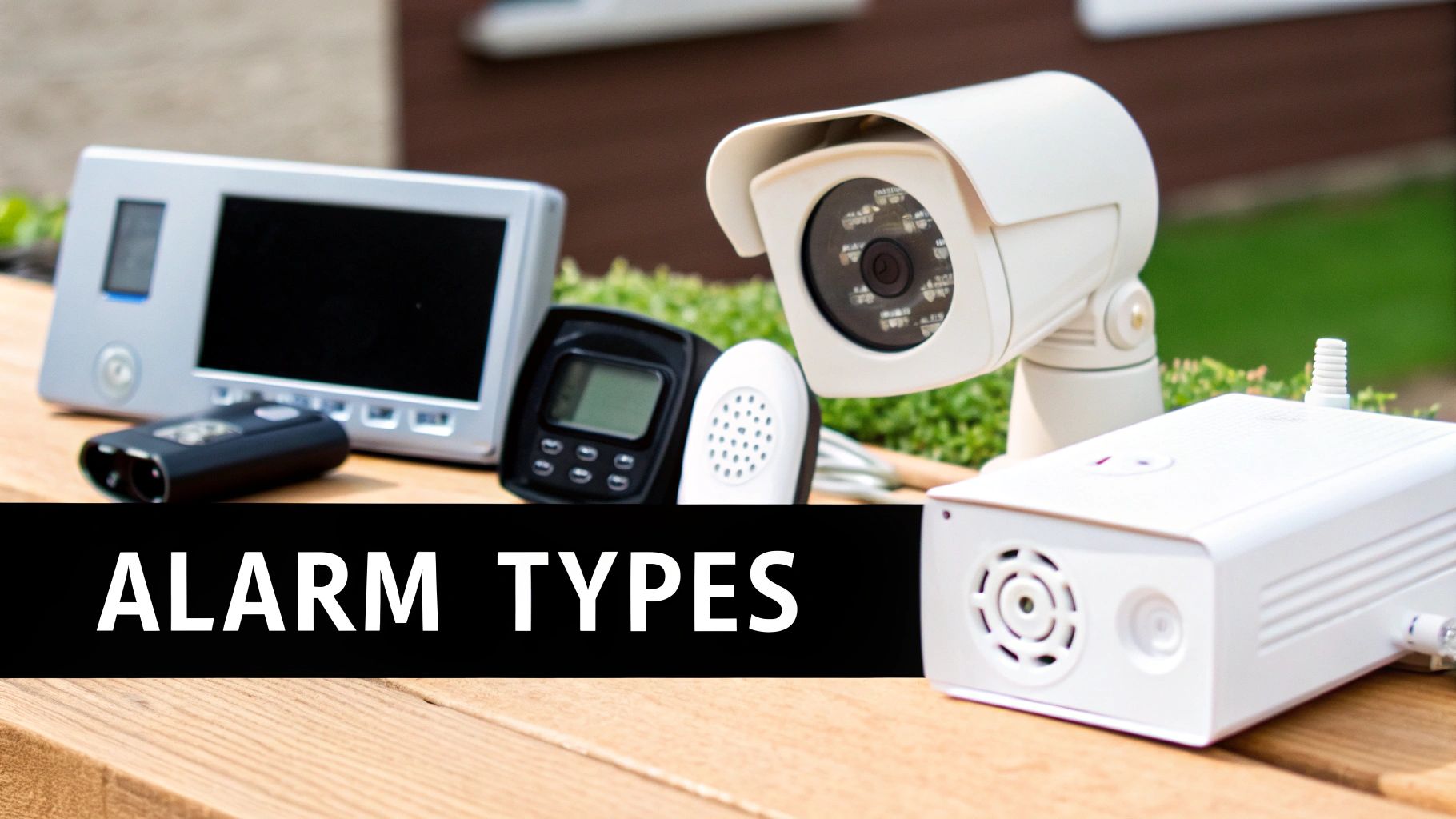Imagine your business's alarm system as a watchdog. A basic, unmonitored alarm is like a dog that just barks loudly—it makes a scene, but can't actually call for help. A monitored alarm, on the other hand, is a watchdog with a direct line to a professional security team, ready to act 24/7. It turns a simple noise into an intelligent, immediate response.
What Exactly Are Commercial Alarm Monitoring Services?
Let's break that down. A traditional alarm just makes a sound at your location. But what if no one is around to hear it or is willing to get involved? Commercial alarm monitoring bridges that critical gap.
When a sensor at your business is triggered—whether it's a door contact, a motion detector, or a smoke alarm—it doesn't just set off a local siren. It sends an immediate, encrypted signal to a remote central station staffed by trained security professionals.
These experts are on standby around the clock, and their first job is to quickly verify the alarm. This step is huge. It filters out the false alarms that can happen from employee error or a simple malfunction, which saves you from costly fees and ensures that when you do need help, it's taken seriously. Once they confirm the threat is real, they leap into action.
The Core Function of Monitoring
The whole process is built for speed and reliability, getting the right kind of help to you when every second counts. It's about much more than just catching burglars. A truly comprehensive service protects your business on multiple fronts.
- Intrusion Detection: The most obvious one. If someone tries to break in, the police are notified immediately.
- Fire and Smoke Alerts: At the first hint of smoke or a sudden temperature spike, the fire department is dispatched—often before anyone on-site even realizes there's a problem.
- Environmental Monitoring: This is the unsung hero. You'll get an alert for non-criminal threats like a burst pipe causing a flood or a server room overheating, saving you from catastrophic damage and downtime.
This layered approach does more than just protect your inventory; it safeguards your ability to do business. To see how these systems can be built around your specific needs, check out our deep dive into security alarm monitoring solutions.
By turning raw alerts into verified emergencies, monitoring services ensure that first responders treat calls from your business with high priority, significantly improving response times when it matters most.
This simple infographic below shows how that life-saving process works, from the initial trigger to the emergency dispatch.

As the visual shows, a professional service is the crucial link between an event at your business and a fast, effective response. It's no wonder the industry is booming. The global alarm monitoring market was valued at $59.46 billion and is expected to climb to $82.67 billion by 2029. That kind of growth shows just how many businesses are recognizing the immense value of having proactive, professional eyes on their property.
The True Value of Professional Monitoring for Your Business

Putting commercial alarm monitoring services in place is about much more than just installing equipment. It’s about building a responsive shield around your business that protects your bottom line when every second counts.
Sure, a standalone alarm might make a loud noise and scare off an intruder. But what happens after that? Professional monitoring turns a passive alert into an active, real-time defense.
Think about it this way: a small fire sparks in your warehouse after everyone’s gone home. An unmonitored alarm just blares into an empty building, while the fire grows. With monitoring, that smoke detector instantly signals a central station. A trained operator immediately verifies the alarm and dispatches the fire department, stopping a small problem from becoming a total catastrophe.
Deterrence and Financial Advantages
Let’s be honest, the best security incident is the one that never happens. Just the sight of security decals and cameras is often enough to make a potential criminal think twice. It tells them your business is a hard target, not a soft one. This simple deterrent effect is your first and most effective line of defense.
The financial upside is just as compelling. Most insurance carriers love to see professionally monitored alarm systems. Why? Because they know it dramatically lowers their risk. It's common to see premium discounts of 5% to 20% for businesses that have these systems in place. Those savings add up and can easily offset the monitoring fees over time.
Professional monitoring is a financial tool. It helps you avoid the devastating costs of theft, property damage, and the operational downtime that follows a major incident.
Protecting People and Operations
At the end of the day, your business is about your people and your ability to keep the doors open. Monitoring services are designed to protect both, extending far beyond simple break-ins.
Here are a few real-world examples of how it works:
- Employee Safety: A team member working a late shift feels threatened. They can hit a panic button, silently alerting the monitoring center. Police can be dispatched immediately without making a dangerous situation worse.
- Asset Protection: Imagine your server room overheating or a pipe leaking near critical equipment. Environmental sensors can detect these changes and trigger an alert, preventing thousands in damage and data loss before you even know there's a problem.
- Business Continuity: Catching a burst pipe over a holiday weekend means you can get it fixed right away. You avoid a massive cleanup and a forced shutdown that could have cost you days of lost revenue.
For companies that oversee large property portfolios, pairing this level of security with smart operational tools is a game-changer. You can check out some of the leading property management apps to see how modern businesses are pulling everything together. By getting ahead of threats, commercial alarm monitoring keeps your business safe, open, and profitable.
Key Features To Look For In A Modern Monitoring Service

When you're shopping for a commercial alarm monitoring service, it’s easy to get lost in the sales pitches. The real value, however, isn't in the promises—it's in the specific features that work together to protect your business.
A truly effective service is built on a few core pillars: unwavering reliability, smart technology that actually works, and a design that puts you, the business owner, firmly in control. Let's break down what that looks like in practice.
The absolute baseline, the non-negotiable starting point, is 24/7 professional oversight. This isn't just an automated system; it's a team of trained professionals watching over your business around the clock. They are ready to respond to any alert, day or night, which makes all the difference between an alarm just making a noise and an alarm triggering an immediate, intelligent response.
Redundant Communication Paths
An alarm system is useless if it can't call for help. What happens if a burglar cuts your internet line or a storm knocks out the power? This is where redundant communication paths become critical.
A top-tier service never relies on a single connection. Instead, it uses a dual-path approach to guarantee the signal always gets through to the central monitoring station.
- Primary Connection: This is usually your business's main internet line, like broadband or VoIP. It's fast and reliable for everyday operation.
- Cellular Backup: This is the crucial fail-safe. If the primary connection ever drops—for any reason—the system instantly and automatically switches to a dedicated cellular connection, ensuring your protection is never interrupted.
Think of it like having a backup generator for your security system. It ensures your link to the monitoring center stays live, even in the face of outages or deliberate tampering.
Video Verification for Faster Police Response
False alarms are a massive headache. They can lead to expensive fines from the city and, even worse, "cry wolf" syndrome, where law enforcement might deprioritize calls from your address. The solution is video verification.
Here’s how it works: when an alarm triggers, the system doesn't just send a generic signal. It also sends a short video clip from the relevant camera directly to the monitoring center.
The operator can see exactly what's happening in real-time. Is it a burglar smashing a window, or just the cleaning crew forgetting the disarm code? This context allows them to dispatch police with a confirmed, active crime in progress, which gets a much higher-priority response.
A verified alarm is no longer just a ringing bell; it’s an active, confirmed event. This distinction is critical for law enforcement and can drastically reduce response times.
Comprehensive Protection and Remote Control
Modern threats go far beyond simple break-ins, and a good monitoring service should reflect that reality while also giving you convenient control.
- Environmental Monitoring: This is about protecting your assets from non-criminal threats. Specialized sensors can alert you to a server room overheating, a pipe leaking in the basement, or dangerous carbon monoxide levels, preventing thousands in damages before they spiral out of control.
- Remote System Control: With a modern system, you should have full control right from your smartphone. A dedicated mobile app lets you arm or disarm the system, check camera feeds, and review event logs from anywhere in the world. It’s peace of mind in your pocket.
- Access Control Integration: When you combine alarm monitoring with a keycard or fob system, you create a seamless security ecosystem. You can learn more about how this works in our guide on access control for business.
Essential vs. Advanced Monitoring Features
Not every business needs the same level of security. Here’s a quick breakdown of what you'll find in standard packages versus more advanced offerings.
| Feature | Description | Best For |
|---|---|---|
| 24/7 Professional Monitoring | A central station with trained operators who respond to alerts around the clock. | All businesses. This is the fundamental component of any monitoring service. |
| Cellular Backup | A secondary communication path that keeps the system online if the primary internet connection fails. | All businesses. Essential for reliable, uninterrupted protection. |
| Remote Arm/Disarm | The ability to control the alarm system (arming and disarming) via a mobile app. | Businesses where owners or managers need to manage security off-site. |
| Video Verification | Operators review video clips to confirm a real threat before dispatching emergency services. | Businesses in areas with high false alarm fines or seeking faster police response. |
| Environmental Sensors | Detectors for threats like fire, flood, carbon monoxide, or extreme temperature changes. | Businesses with critical infrastructure, server rooms, or valuable inventory. |
| Access Control Integration | The alarm system works in tandem with keycard/fob systems to manage and log entry. | Companies needing to secure sensitive areas and track employee movement. |
| Smart Automation | The ability to create rules, such as automatically locking doors when the system is armed. | Businesses looking to streamline operations and reduce the risk of human error. |
Choosing the right mix of features ensures you get the protection you actually need without paying for extras that don't fit your business model.
These capabilities are becoming the new standard as the commercial security market, currently valued at around $204 billion, continues to evolve. Fueled by advancements in AI and IoT, the industry is projected to reach an incredible $381.66 billion by 2030. You can see detailed analysis in this commercial security system market report. For a real-world look at how high-level platforms manage data, you can review examples like Resgrid's security practices.
How to Choose the Right Monitoring Provider

Picking a provider for your commercial alarm monitoring services is a major decision. Think of it less like buying a product and more like entering a long-term partnership. You're handing over the keys to someone you trust to protect your people, your property, and your entire operation.
To make the right choice, you have to dig deeper than a slick sales presentation. It's about finding concrete proof that a company can deliver when things go wrong.
It’s a lot like hiring a key employee. You wouldn't bring someone on board without checking their references and qualifications, right? The same logic applies here. Start by checking a provider's reputation, but make sure you’re looking at real, unbiased feedback.
Find case studies or testimonials from businesses that look like yours—similar in size, industry, and security challenges. A rave review from a small coffee shop won't tell you much if you're trying to secure a sprawling industrial complex. You need to see how they've performed for others in your shoes.
Verify Credentials and Certifications
Certifications aren't just for show; they're your guarantee that a provider meets recognized industry standards. If you only check one thing, make it this: ensure they operate a UL-Listed Central Monitoring Station.
This isn't just a plaque on the wall. Underwriters Laboratories (UL) puts monitoring centers through an incredibly tough certification process. A UL listing is proof that the facility has:
- Redundancy: Multiple layers of backup power and communication lines so they never go down, even during a power outage or a storm.
- Security: The physical monitoring center itself is a fortress, built to withstand threats.
- Staffing: It’s manned 24/7/365 by trained professionals who adhere to strict, proven protocols for every type of emergency.
When you partner with a UL-Listed provider, you know your alerts are being handled by an operation designed for absolute reliability. It's the gold standard in this business, and you shouldn't settle for anything less.
Scrutinize Contracts and Response Times
The devil is always in the details, especially when it comes to service contracts. Before you even think about signing, you need clear, written answers to some critical questions. Any provider worth their salt will be completely transparent.
A great security partner doesn't just sell you a service; they offer a clear, understandable agreement that aligns with your business goals, free from hidden clauses and restrictive terms.
Ask them point-blank: what is your average response time? That’s the time it takes from when they receive an alarm signal to when an operator actually acts on it. You want to hear an answer in seconds, not minutes.
You also need to understand the contract terms inside and out. Watch out for long-term agreements with automatic renewals and steep penalties for early cancellation. Your business needs will change, and your security contract should offer the flexibility to adapt with you.
Finally, get a full breakdown of the pricing. What costs exist beyond the monthly monitoring fee? Ask about charges for service calls, potential equipment upgrades, and even false alarm fines. A trustworthy partner provides predictable costs with no surprises. The goal is to find someone who can scale with you and become a true, long-term security partner.
Understanding Commercial Alarm Monitoring Costs
When you're looking at professional commercial alarm monitoring services, it's easy to get sticker shock if you only see a single number. But it's not just a monthly bill—it's a critical investment in protecting everything you've built. To really get a handle on it, you need to look at the whole picture, from the day of installation to the ongoing peace of mind that comes with 24/7 protection.
Think of it in two parts. First, you have the upfront costs. This is for the tangible stuff: the sensors, control panels, cameras, and the expertise of a professional to install it all correctly. After that, you have the recurring monthly fee, which is what keeps the lights on at the central monitoring station, ensuring someone always has your back.
Breaking Down the Investment
The initial price for equipment and installation can swing wildly depending on what you need. A small boutique might just need a couple of door sensors and a camera, keeping things simple and affordable. A sprawling warehouse, on the other hand, will demand a much more complex web of devices to cover every angle.
Your monthly monitoring fee is also a moving target, tied directly to the services you need. Basic intrusion and fire detection are the bread and butter, so they'll be on the lower end of the cost spectrum. But if you want advanced features like video verification, environmental monitoring, or integrated access control, you can expect the price to go up. For a deeper dive into the numbers, check out our guide on the total business security system cost.
When you're building your budget, don't just see the monthly fee as another expense. Think of it as an insurance policy. The financial fallout from a single fire or a major burglary could dwarf years' worth of monitoring fees in an instant.
Typical Cost Breakdown for Monitoring Services
To give you a clearer picture of what to budget for, let's look at how the different tiers of service stack up. Prices will always vary between providers and what part of the country you're in, but these ranges are a great starting point.
Here's a quick overview of what you can expect to pay and what you get for your money.
| Service Tier | Typical Monthly Fee Range | Key Features Included |
|---|---|---|
| Basic | $30 – $50 | 24/7 professional monitoring for intrusion and fire alarms, with cellular backup communication. |
| Standard | $50 – $75 | Includes all Basic features plus remote system control via a mobile app and real-time text/email alerts. |
| Advanced | $75 – $120+ | All Standard features plus video verification, environmental sensors, and access control integration. |
This tiered approach helps businesses find that sweet spot between their security requirements and their operating budget. It’s no surprise the commercial security alarm market in the U.S. is a $37.7 billion industry and growing. You can discover more insights about the security alarm services market to see the trends for yourself.
By taking the time to understand what each tier offers, you can make sure your investment is working for you, delivering both robust security and true peace of mind.
Got Questions? We’ve Got Answers.
When you're thinking about commercial alarm monitoring services, the theoretical benefits are great, but the practical, "what-if" questions are what really matter. How does the system hold up when things go wrong? Let's walk through some of the most common questions business owners have, so you can feel confident in what you're getting.
It's all about understanding how the technology performs in the real world.
What Happens If the Power or Internet Goes Out?
This is easily one of the biggest concerns, and for good reason. The answer boils down to one word: redundancy. Any professional-grade alarm system is built with failures in mind, so your protection never skips a beat.
First, every system comes with a battery backup. The second the power cuts out, the battery kicks in automatically, keeping everything running for several hours. This handles most temporary outages without any issue.
But what about communication? If your internet connection drops, the system instantly switches over to a secondary cellular link. This fail-safe ensures that any alarm signal gets through to the monitoring center, no matter what happens to your primary connection.
How Does Video Verification Work, and Why Should I Care?
Video verification is a huge step up for business security. It’s a simple but brilliant idea: your cameras and alarm sensors talk to each other.
Here’s how it works: When a sensor is tripped—maybe a motion detector after hours or a door sensor—the system doesn't just send a generic alert. It also sends a short video clip of that exact moment to the central monitoring station. A trained operator immediately watches the clip to see what's happening.
Is it a burglar breaking a window, or just a banner falling over? By visually confirming a genuine threat, the operator can report a verified "crime in progress" to the police. This kind of alert gets a much higher priority, which means a faster response.
This feature is crucial for two reasons. First, you get help faster when it counts. Second, it virtually eliminates the hassle and expense of false alarm fines caused by innocent mistakes.
Can I Connect Alarm Monitoring with My Other Business Systems?
Absolutely. In fact, this is where modern security systems truly shine. Integration allows you to create a smart, unified ecosystem where different technologies work together to make your business safer and more efficient.
You can combine alarm monitoring with things like:
- Access Control: Sync your alarm with your keycard or fob system. This lets you manage who can go where and when, all while automatically arming or disarming parts of the building based on set schedules. All from a single dashboard.
- Building Automation: Link your security system to your smart lights, thermostats, and HVAC. If a fire alarm is triggered, the system can be programmed to automatically unlock emergency exits, shut down air circulation to contain smoke, and turn on lights to help guide people out.
What Is a UL-Listed Central Monitoring Station?
Think of "UL-Listed" as the gold standard for monitoring centers. The "UL" is for Underwriters Laboratories, a third-party organization that sets incredibly strict benchmarks for safety and reliability.
For a monitoring center to earn this certification, it has to pass a tough audit on everything from the strength of its walls to the training of its staff. A UL-Listed station guarantees:
- Total Redundancy: Backup power, backup communications, backup servers. Everything has a backup.
- High Security: The building itself is fortified to withstand fires, floods, and even physical attacks.
- 24/7 Professional Staffing: The station is staffed around the clock, 365 days a year, by expert operators who follow proven procedures.
When your provider uses a UL-Listed station, you can trust that your alarms are being handled by a team that is prepared for anything.
At Clouddle Inc, we provide integrated security solutions with UL-Listed monitoring to ensure your business is protected by the most reliable technology available. Learn how our services can safeguard your assets today.


